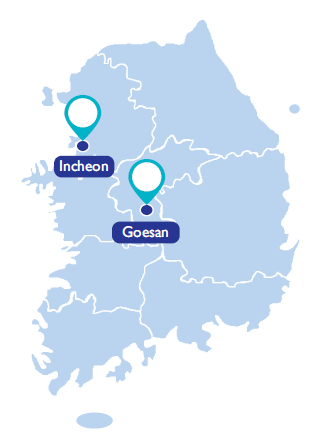- Home
- Investment Opportunities
- Sites
- Location Report
Location Report
Since the Miracle on the Han River, South Korea has experienced exponential growth across all sectors. The food and beverage industry of Korea was no exception. From a country that barely produced enough to feed themselves, Korea has emerged as a strong exporter of food products. In recent years, its food manufacturing industry has grown at a rate of 6.8 percent per year, while the food service industry recorded a growth rate of 8.9 percent. In terms of market size, Korea is the 14th largest food market in the world.
The size of Korea’s food industry is
expected to break through the KRW 200
trillion (USD 183.8 billion) mark and the
local governments are further developing
the country’s food industry clusters. These
include the I-Food Park in Incheon and the
Goesan Agricultural and Industrial complex.
I-Food Park
Located in Incheon, Korea’s logistics
haven, I-Food Park is the first food industry cluster to be established in the capital
area. Spanning across a land of 261,000
square meters, the cluster will gather various food manufacturers, ultimately
increasing the industry’s potential. The
cluster will be completed in the second
half of 2018, and is expected to cost a total
of KRW 140 billion (USD 128.66 million).
The I-Food Park aims to create jobs,
increase investments and vitalize the economy of Incheon. The cluster is expected to
create 16,000 jobs for locals and bring in
KRW 890 billion (USD 817.91 million) in
economic impact to the region. Already,
there are about 40 companies that have
expressed their desire to move into the
cluster.
The park will provide cutting-edge infrastructure for resident companies, allowing
them to find and successfully enter overseas market, including the Chinese market.
R&D centers, Hazard Analysis and
Critical Control Points (HACCP)-related
facilities and logistics complexes will be
established to further develop the food
industry.
In addition, the cluster aims to modernize the manufacturing facilities which will
allow the businesses to operate with efficiency allowing them to produce cheaper
and provide higher quality products for the
consumers. Like any other cluster, the I-
Food Park also hopes that the latest technology and knowledge related to the industry can be shared amongst the resident
companies, further developing their manufacturing capabilities. The businesses that
move in to the cluster will receive various
tax-related benefits and will be able to easily access Incheon airport and Incheon
port.

Goesan Agricultural and Industrial
Complex
At the very center of Korea is a city in
which the world’s first organic produce
exhibition was held. The city is Goesan, a
mecca for the fermented food and organic
produce industry. Due to its incredible
positioning, all of the businesses that reside
in its Agricultural and Industrial Complex
are able to reach any part of the country in
just a few hours.
Next to this complex is the Goesan
Fermented Food Agriculture-Industrial
Complex and the Organic Produce
Industrial Complex. The fermented food
complex was established with a cost of
KRW 26 billion (USD 24 million) and
already there are 12 businesses that are
doing business in the 323,511 square
metered cluster. The complex provides
top-class infrastructure including two newly built factories. Its beverage factory has
the capability of producing 9 million bottles of beverages (soy milk, fruits and vegetable juice) per year. The milling factory
can grind 20 tons of rice per day, and is
operated with the goal of reducing production costs and increasing the income for
agricultural households.
The Organic Produce Complex covers
628,497 square meters and hosts environmentally-friendly logistics and companies
related to food manufacturing, especially
those that are experts in organic produce.
The clusters that have been introduced
here are all working towards the common
goal of supporting the continuous development of the Korean food and beverage
industry. They also seek to boost the
regional economy, and ultimately the
economy of the country. Most importantly,
these clusters aim to provide high-quality,
safe and affordable products for consumers. With the complexes providing a
solid foundation, the food and beverage of
industry of Korea is set to accelerate its
growth and development.










